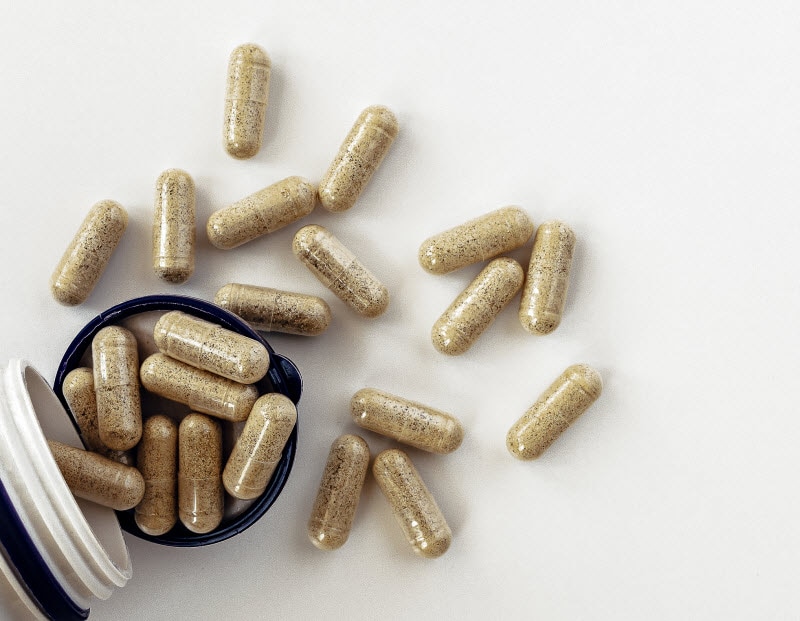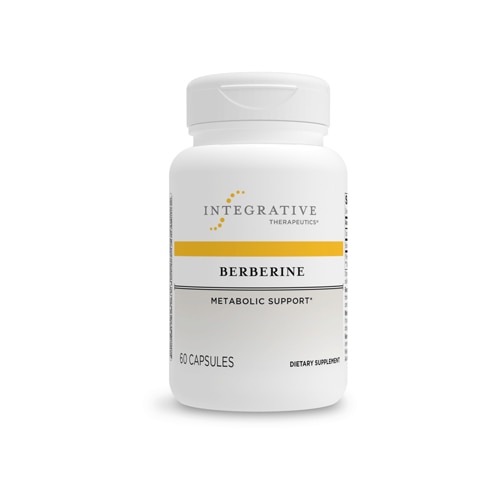[vc_row][vc_column][vc_column_text]
Hydroxypropyl methylcellulose…
Glycerin…
Stearic Acid…
Take a peek below the Supplement Facts on your daily multivitamin. Are these ingredients in your supplement?

When we take
dietary supplements, we’re typically focused on what’s in the Supplement Facts panel, which tells us how much of the various dietary nutrients or other non-essential but potentially beneficial ingredients we’re consuming. But that’s rarely comprehensive of what’s in the tablets, capsules or
gummies that we swallow daily.
If you’ve ever taken a magnifying glass - literally or figuratively – to that tiny text, you may have wondered what these strange-sounding “other ingredients” are doing in your supplement. And if you’ve compared various bottles side-by-side, you might also be puzzled by how and why these lists can differ so much between brands or products.
The fact that additives are so common in supplements should give you a hint that there is substance behind these sometimes-unpronounceable ingredient names; each one is added for a specific purpose. But there’s plenty of bad press on these unfamiliar extras, so let’s clear up the confusion and get supplement-savvy
Fillers and Additives: What You Need to Know
A class of their own
As their identity implies, dietary supplements, by definition, must only contain ingredients that are safe for human consumption. Any substance that is intentionally or incidentally added to a supplement must be deemed safe by the Food and Drug Administration (FDA) based on estimated daily consumption by the average consumer.
“Other Ingredients” in a supplement can be classified as either a dietary ingredient, a functional ingredient or a food additive. Either way, these
ingredients are scrutinized for function, toxicity and safety by the FDA and approved as a food ingredient when the evidence strongly precludes a chance of harm when consumed as expected.
Food additives must have a legitimate technical or functional purpose during manufacturing or to enhance the quality or efficacy of a product. Sometimes, but rarely, additive approvals can come with limits on how much products can contain if toxicity data suggests an upper safety threshold. Both natural and synthetic substances are approved under this category, as long as the man-made forms are chemically exact and just as biologically useful to our bodies.
A field trip to the factory
Now that you’re aware of who’s watching
what goes into our supplements, let’s find out why non-active ingredients are even necessary. Generally, food additives are used either to (1) make production possible, (2) enhance product performance, or (3) maintain the quality of the finished product.
They might look simple, but the tablets and capsules that go down with a quick glass of water are a technical feat. Various ingredients behave in different ways when they’re processed and combined, so many additives play a critical role in creating a uniform and consistent blend that can be efficiently and reliably manufactured.
Plant-derived cellulose, in miscellaneous forms, and oil-based stearic acid are common binders and stabilizers in supplement formulas. A modified form of cellulose (hypromellose) may also be a primary ingredient in vegetarian capsule shells. Some additives like silicon dioxide absorb moisture and help ensure that components don’t stick together or to machinery.
While food-bound nutrients are in complex forms that our body breaks down in stepwise fashion, supplements must be designed to dissolve and disperse at the right time and in the right place. So, some additives and fillers help carry and preserve active ingredients and enhance their absorption. Some indigestible plant starches and gums, like croscarmellose sodium and acacia gum, serve this purpose.
Finally, supplements can only be beneficial when they retain their potency and avoid spoiling before you finish the bottle. Fillers and stabilizers contribute to this goal, but more specific preservatives like ascorbic acid, tocopherols, and sodium benzoate help prevent oxidation from light and heat and keep the pH low to discourage bacterial growth.
Additive anxiety
If every supplement ingredient is safe and functional, what’s behind the wariness? Not just consumers, but numerous medical, scientific and environmental advocacy groups have cast a wary eye on the various additives and fillers that we ingest in our food and absorb from unknowing sources. While suspicion and distrust can always be found on the fringe, legitimate experts have brought fair arguments to light.
It’s valid to wonder how these various ingredients interact within our diets as a whole, and how much we actually accumulate if we’re taking multiple supplements and consuming processed foods, too. Likewise, many of these ingredients have only been part of our food supply for a decade or two. Is there credence to concerns over the long-term effects from seemingly unnatural substances?
In 2020, a dozen public health stakeholders crafted a
citizen petition, urging the FDA to enhance the level of evidence required to prove food additive safety. The primary principle behind the petition was that current consumption estimates for food additives do not account for either their cumulative or long-term effects. The letter also emphasized that FDA reviews fail to consider potential interactions between various non-dietary ingredients with each other and with foods, a potentially impossible task.
Other reasonable opposition comes on behalf of our environment. What are the ecological consequences of harvesting innumerable plant fibers, oils, and minerals to carry the active nutrients we’re really seeking? Finally, how do we know for certain that contaminated ingredients don’t sneak through the cracks?
Weighing the worries
There’s not a satisfying answer for every fear, but rational reassurance can be found to mitigate much of the skepticism. In addition to strict federal oversight of ingredient safety and product labeling of food and dietary supplements, independent scientific research is available to inform our personal choices. Safety conclusions by the FDA tack a 100-fold safety margin onto potential risk levels, diluting many concerns. And most common additives have been deemed safe enough to skip a specific safety threshold. We’re far from the wide consensus needed to give sway to naysayers.
You often hear advice to avoid ingredients “that you can’t pronounce.” But this common adage is overblown. While chemical names can be illegible, they don’t always deserve the fear they often provoke. There’s a chemical name for every material substance on earth, from pure water (dihydrogen monoxide) to salt (sodium chloride) to vinegar (acetic acid). Silicon dioxide, or silica, is just the chemical name for sand!
Next, “natural” ingredients aren’t always safer or better than synthetic alternatives. Plenty of natural substances, like arsenic, lead and cyanide can be toxic or deadly in trace or accumulating amounts. Chemically equivalent man-made ingredients can be more suitable than naturally derived sources in terms of purity, potential allergens, dietary preferences (vegetarian, vegan), and sustainability.
Supplement manufacturers often choose specific additives based on brand preferences, cost, and availability. So there are certainly degrees of quality, with premium prices often (but not always) reflecting superior and more trustworthy ingredient sources. While there are inevitably shady players to spoil the game, industry and regulatory accountability place significant pressure on brands to stay clean.
Aside from common consumer worries and presumptions on unfamiliar ingredients, some fear that non-food sources are laced with more chemicals, heavy metals, or contaminants. But the truth is that any ingredient added to a dietary supplement must follow good manufacturing processes and pass the same quality assurance checks for a more recognizable “clean” ingredient from food, like the cocoa in your favorite
protein powder.
Supplement with good sense
Hopefully that provides some peace of mind that supplements don’t have to be scary. For most of us, the benefits far outweigh the risks, so taking a stance of abstinence on supplements might be just as unwise. Like most health-related decisions, being educated, staying informed, and finding the truth on both sides are the keys to sensible supplementation.
But if you’re looking to minimize the minutiae inside your supplements, here are a few tips:
1. Stick to the essentials – Have your doctor assess your nutrient status with bloodwork and just take what you need, while you need it. Most evidence suggests that indigestibles like cellulose and silica are largely eliminated, but the truth is we don’t know enough about perpetually taking multiple supplements.
2. Take less – Supplements aren’t drugs. Serving sizes and instructions on the label are informed suggestions. While you should never take more without your doctor’s consent, you can always take fewer tablets or capsules to reduce your additive exposure.
3. Try liquids or powders – Capsule-based supplements tend to be the most complex when it comes to their ingredient profiles. Nowadays, many nutrients can be found in
powders and
liquids that require less technical tweaking.
4. Eat your veggies – Not only does a well-rounded diet maximize your daily nutrition, many plant-based foods promote your body’s natural detox and elimination pathways, so any funny fillers quickly find an exit.
5. Stay tuned – Keep your eyes out for novel earth-friendly replacements for binders, emulsifiers, and disintegrants like gum acacia, rice hulls and psyllium.[/vc_column_text][/vc_column][/vc_row][vc_row][vc_column][vc_text_separator title="Featured Products" border_width="2"][vc_row_inner equal_height="yes" content_placement="middle" gap="35"][vc_column_inner width="1/3"][vc_single_image image="165121" img_size="full" alignment="center" onclick="custom_link" img_link_target="_blank" css=".vc_custom_1677438738074{padding-right: 7% !important;padding-left: 7% !important;}" link="https://www.vitacost.com/vitacost-immune-support-gummies"][/vc_column_inner][vc_column_inner width="1/3"][vc_single_image image="165119" img_size="full" alignment="center" onclick="custom_link" img_link_target="_blank" css=".vc_custom_1677438755497{padding-right: 7% !important;padding-left: 7% !important;}" link="https://www.vitacost.com/natural-stacks-serotonin-brain-food-capsules"][/vc_column_inner][vc_column_inner width="1/3"][vc_single_image image="165120" img_size="full" alignment="center" onclick="custom_link" img_link_target="_blank" css=".vc_custom_1677438771010{padding-right: 7% !important;padding-left: 7% !important;}" link="https://www.vitacost.com/new-chapter-womens-multivitamin-gummies"][/vc_column_inner][/vc_row_inner][/vc_column][/vc_row]
 When we take dietary supplements, we’re typically focused on what’s in the Supplement Facts panel, which tells us how much of the various dietary nutrients or other non-essential but potentially beneficial ingredients we’re consuming. But that’s rarely comprehensive of what’s in the tablets, capsules or gummies that we swallow daily.
If you’ve ever taken a magnifying glass - literally or figuratively – to that tiny text, you may have wondered what these strange-sounding “other ingredients” are doing in your supplement. And if you’ve compared various bottles side-by-side, you might also be puzzled by how and why these lists can differ so much between brands or products.
The fact that additives are so common in supplements should give you a hint that there is substance behind these sometimes-unpronounceable ingredient names; each one is added for a specific purpose. But there’s plenty of bad press on these unfamiliar extras, so let’s clear up the confusion and get supplement-savvy
When we take dietary supplements, we’re typically focused on what’s in the Supplement Facts panel, which tells us how much of the various dietary nutrients or other non-essential but potentially beneficial ingredients we’re consuming. But that’s rarely comprehensive of what’s in the tablets, capsules or gummies that we swallow daily.
If you’ve ever taken a magnifying glass - literally or figuratively – to that tiny text, you may have wondered what these strange-sounding “other ingredients” are doing in your supplement. And if you’ve compared various bottles side-by-side, you might also be puzzled by how and why these lists can differ so much between brands or products.
The fact that additives are so common in supplements should give you a hint that there is substance behind these sometimes-unpronounceable ingredient names; each one is added for a specific purpose. But there’s plenty of bad press on these unfamiliar extras, so let’s clear up the confusion and get supplement-savvy



